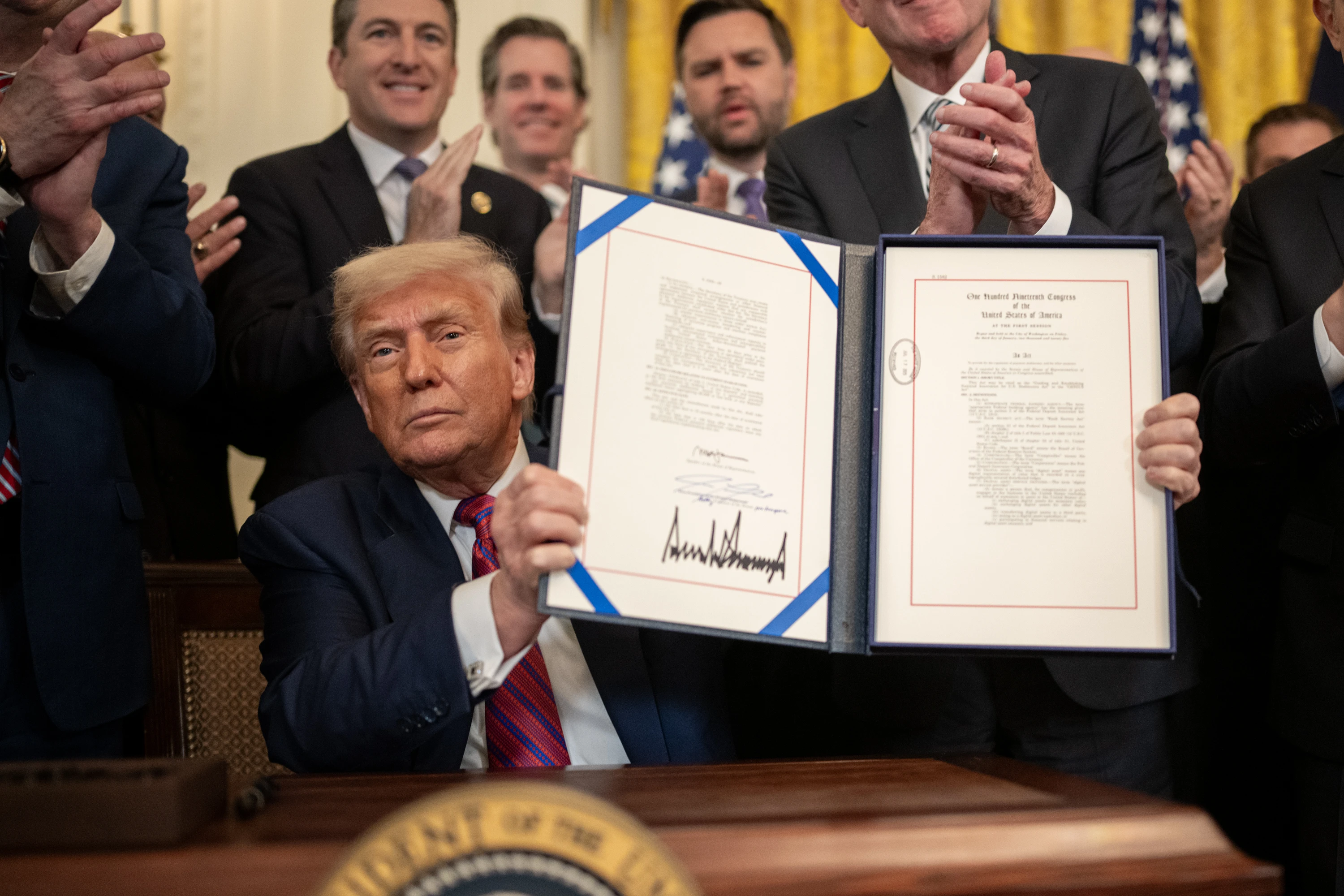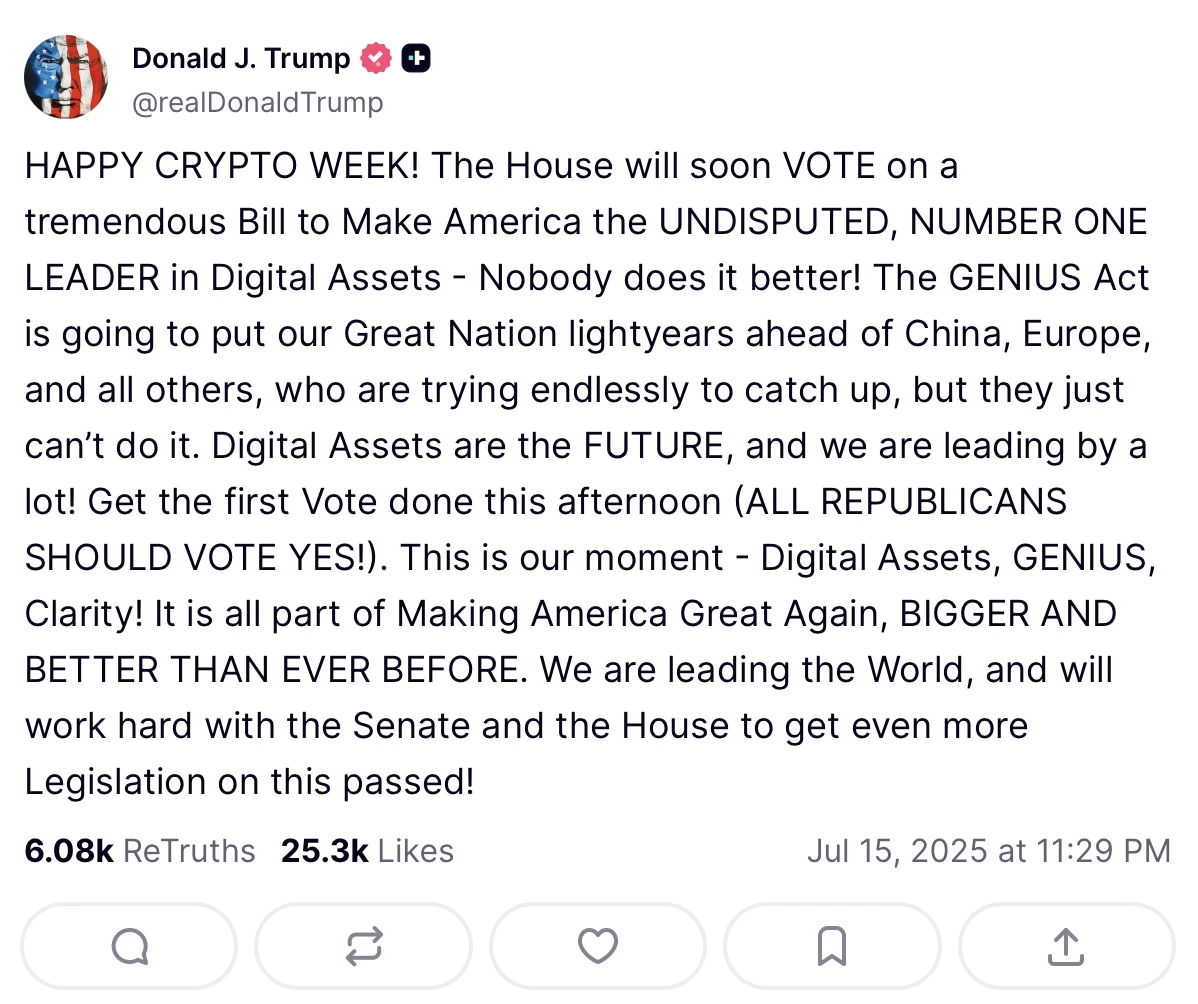Original | Odaily Planet Daily (@OdailyChina)
Author | Azuma (@azuma_eth)

In the early hours of July 19, Beijing time, U.S. President Trump officially signed the highly anticipated GENIUS Act in the East Room of the White House. This not only signifies that this legislation, which will undoubtedly have a profound impact on the development of the stablecoin industry, has completed all legislative processes and has officially become a law pending enactment; it also marks the first time in modern history that a U.S. president has signed a law focused on cryptocurrency, opening a new chapter for the industry.
To commemorate this historic moment, the White House invited executives from several cryptocurrency industry companies, including Robinhood, Tether, Gemini, and Multicoin, to witness the signing of the GENIUS Act.
A Twisted Crypto Week
Earlier this week, the "Crypto Week" kicked off on Capitol Hill, where the House of Representatives was set to review three important cryptocurrency bills led by Republicans — the GENIUS Act, the CLARITY Act, and the Anti-CBDC Act.
On the eve of the review, Trump specifically posted on Truth Social to rally support for the three bills and stated that he would work with both the House and Senate to push for the passage of more related legislation; however, the review process did not go as smoothly as everyone had hoped.

In the early hours of July 16, Beijing time, the review process officially began, but the first procedural vote (not the final vote, but necessary to continue the voting process) ended in a failure with a result of 196-223. The main reason for the failure was that 12 conservative Republican representatives voted "no," with some dissenting members insisting that the three bills should be bundled together for advancement.
Subsequently, although Trump claimed to have met with most of the dissenting members to persuade them to change their votes in the next procedural vote, the review process was temporarily stalled — journalist Eleanor Terrett, who has been tracking cryptocurrency policy dynamics, even used terms like "chaos," "still waiting," and "uncertain what will happen" to describe the situation at that time.
Ultimately, after 48 hours of internal negotiations, the review process was restarted. Although there was significant uncertainty during the process (the Anti-CBDC Act even saw a record-breaking nearly 10-hour marathon vote), all three bills were finally passed in the early hours of July 18.
Among them, the core GENIUS Act passed in the House with 308 votes in favor and 122 against, and notably, there was a rare bipartisan consensus during the vote — over 100 Democrats switched sides to support this Senate-initiated bill, including House Minority Leader Hakeem Jeffries from New York.
Additionally, the highly anticipated CLARITY Act passed with a vote of 294 to 134, with 78 Democratic representatives supporting this market structure bill aimed at establishing a regulatory framework for digital assets. Jeffries voted against it, but key figures like former Speaker Nancy Pelosi chose to support it.
The Anti-CBDC Act narrowly passed with a vote of 219 to 210, with only two Democrats supporting this proposal to prohibit the Federal Reserve from issuing digital currency.
Since the GENIUS Act had already passed the Senate, with the House vote's approval, the bill was directly submitted to the White House — as mentioned earlier, Trump signed the bill the very next day; the other two bills will be handed over to the Senate for the next round of review.
What Does the Signing of the GENIUS Act Mean for the Industry?
Regarding the GENIUS Act, the market has been heating up and building momentum for a long time, but many may not realize what this means for the market.
The full name of the GENIUS Act is the Guiding and Establishing National Innovation for US Stablecoins Act, which was jointly proposed by U.S. Senators Bill Hagerty, Tim Scott, Kirsten Gillibrand, and Cynthia Lummis on February 4 of this year, aiming to establish a legal framework for the legal use of stablecoins for payments within the United States.
The core provisions of the bill are as follows.
Definition of Payment Stablecoins: Digital assets anchored to a fixed currency value, fully backed 1:1 by U.S. dollars or other highly liquid assets, specifically for payment settlement scenarios.
Dual Licensing Regulation: Federal regulation for issuers with a market cap over $10 billion; state-level regulation allows smaller issuers to choose state registration (must meet federal equivalency standards).
100% Reserve Requirement: Reserve assets limited to cash, short-term U.S. Treasury securities, or central bank deposits, and must be segregated from operating funds. Monthly proof of sufficient reserves must be submitted to ensure users can redeem at face value.
Mandatory Transparency Disclosure: Regular public disclosure of reserve composition and redemption policies, subject to compliance audits by registered accounting firms.
Anti-Money Laundering Compliance: Issuers will be subject to the Bank Secrecy Act, fulfilling AML obligations at the level of financial institutions.
Priority Protection for Users: In the event of issuer bankruptcy, stablecoin holders' claims will take precedence over other claimants.
Clear Regulatory Authority: Clearly states that payment stablecoins do not fall under the categories of securities, commodities, or investment companies, delineating regulatory boundaries.
From an industry impact perspective, the GENIUS Act, as the first federal-level stablecoin legislation, is widely viewed in the industry as a significant step for stablecoins to move out of the phase of unregulated growth and into compliance, with the potential to advance into broader markets such as payments.
From a symbolic standpoint, the GENIUS Act, as the first cryptocurrency legislation signed by a U.S. president, will also become a major milestone event for the compliance and popularization of cryptocurrency, providing the strongest endorsement for the entire industry.
The Greatest Revolution in Financial Technology Since the Birth of the Internet
With the completion of the signing of the GENIUS Act this morning, the White House issued an official announcement praising the bill, stating that it "will pave the way for the U.S. to lead the global digital currency revolution."
At the signing event, Trump also told several industry representatives: “As I promised last year, the GENIUS Act creates a clear and simple regulatory framework for dollar-backed stablecoins, unlocking their tremendous potential. This may be the greatest revolution in financial technology since the birth of the internet. Many people are saying this.”
Another statement from Trump may resonate even more with every cryptocurrency practitioner — “What I want to say is that the entire cryptocurrency community has been laughed at, ignored, and dismissed for years. Just a year and a half ago, you were considered insignificant, but this signing will be a huge recognition.”
Times are changing, and we are witnessing the gradual fading of the industry's gray areas; the future will always be brighter.
免责声明:本文章仅代表作者个人观点,不代表本平台的立场和观点。本文章仅供信息分享,不构成对任何人的任何投资建议。用户与作者之间的任何争议,与本平台无关。如网页中刊载的文章或图片涉及侵权,请提供相关的权利证明和身份证明发送邮件到support@aicoin.com,本平台相关工作人员将会进行核查。




